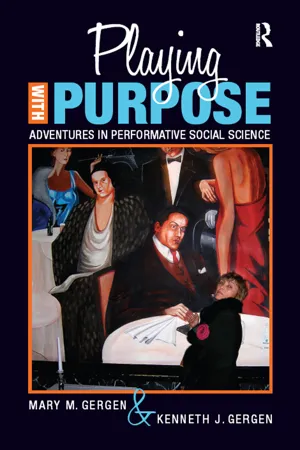
eBook - ePub
Playing with Purpose
Adventures in Performative Social Science
- 247 pages
- English
- ePUB (mobile friendly)
- Available on iOS & Android
eBook - ePub
About this book
Distilling decades of work spanning their prestigious careers, Mary M. and Kenneth J. Gergen make a strong case for enriching the social sciences through performative work. They present a unique exploration of the origins of performative social science and provide an intellectually rich overview of its significance in the field, as well as its evolving potential. Many of their own performance pieces are included in the volume. The authors envision a broadening of the social sciences, making it more accessible to non-experts and opening up new dialogues between society and science—and changing the world in the process. Social scientists and researchers will gain a valuable new perspective from this insightful tome.
Frequently asked questions
Yes, you can cancel anytime from the Subscription tab in your account settings on the Perlego website. Your subscription will stay active until the end of your current billing period. Learn how to cancel your subscription.
No, books cannot be downloaded as external files, such as PDFs, for use outside of Perlego. However, you can download books within the Perlego app for offline reading on mobile or tablet. Learn more here.
Perlego offers two plans: Essential and Complete
- Essential is ideal for learners and professionals who enjoy exploring a wide range of subjects. Access the Essential Library with 800,000+ trusted titles and best-sellers across business, personal growth, and the humanities. Includes unlimited reading time and Standard Read Aloud voice.
- Complete: Perfect for advanced learners and researchers needing full, unrestricted access. Unlock 1.4M+ books across hundreds of subjects, including academic and specialized titles. The Complete Plan also includes advanced features like Premium Read Aloud and Research Assistant.
We are an online textbook subscription service, where you can get access to an entire online library for less than the price of a single book per month. With over 1 million books across 1000+ topics, we’ve got you covered! Learn more here.
Look out for the read-aloud symbol on your next book to see if you can listen to it. The read-aloud tool reads text aloud for you, highlighting the text as it is being read. You can pause it, speed it up and slow it down. Learn more here.
Yes! You can use the Perlego app on both iOS or Android devices to read anytime, anywhere — even offline. Perfect for commutes or when you’re on the go.
Please note we cannot support devices running on iOS 13 and Android 7 or earlier. Learn more about using the app.
Please note we cannot support devices running on iOS 13 and Android 7 or earlier. Learn more about using the app.
Yes, you can access Playing with Purpose by Mary M Gergen,Kenneth J Gergen in PDF and/or ePUB format, as well as other popular books in Psychology & Research & Methodology in Psychology. We have over one million books available in our catalogue for you to explore.
Information
SECTION III
DRAMATIC ARTS: IDEAS IN ACTION

Speaking is essentially a social performance. As we speak we address others, with the expectation that their actions will be coordinated with ours. If we went about speaking to no one, we might be judged mad; if others’ actions were not coordinated with ours, we would fail to “make sense.” But the words are only partial performances. The quality of the voice—its volume, rapidity, and tone—is essential to the performance, along with facial features, gestures, and posture. Compared to the richly laden practice of everyday communication, most social science writing is indeed impoverished. The text is addressed to no one in particular and without any obvious context; the coordinated actions from which the life of the text is generated are not in view; and the words themselves circulate without an attached body. For the scholarly community, writing can have especially deadening effects. We appear to each other not as fully embodied creatures, but as ghostly mentalities. We write into a social vacuum, bereft of the corporal coordination that brings life to language. There is ample reason, then, to move beyond dry and deadly forms in our scholarly work, and to return language to its vital place in the embodied dramas of relationship. It is against this background that the two of us have set out to explore ways of realizing scholarly ideas in theatrical performances. The drama of attempting to do drama is perhaps a chapter in itself. In what follows, however, we share a number of attempts that have given pleasure to us, and we hope to our various audiences. Alas, with the limitations of print media, we can only share the verbal skeletons. We can only invite the readers to let their imagination roam freely.
10
Performing the Mind

As outlined in chapter 2, for us there is a close association between a social constructionist view of knowledge and the performative turn. From a constructionist standpoint, what we count as the real and the good is generated within relationships or communities of practice. This would include what we take to be the reality of mind. If it is only by convention that we presume the existence of minds—of thought, motivation, emotion, and the like—then “mind talk” is fundamentally optional. That is, we are free to generate alternative accounts of the person. Why should one take up such a challenge? According to the traditional view, our minds are private possessions—inside our heads—and the primary source of our actions. However comfortable this Western view may be, it is also a tradition that divides us. It suggests that I am living inside my mind, you within yours. We are fundamentally isolated and alienated. I am the master of my own actions; you should not interfere. I am seeking the ends that I desire, and you likewise. If we collaborate, it is only because it allows us to better fulfill our private desires. Fundamentally it is a war of all against all, but if we can make necessary agreements, and if we have moral injunctions to help our neighbors, then cultural life may be viable. In effect we create a culture pervaded by loneliness, manipulation, exploitation, anxiety, and ruthlessness.
How else could we understand human action, and its source? What if we could understand ourselves as fundamentally relational beings, never alone or isolated, and treat the processes of thinking, feeling, wanting, and so on as constituents of a relational process? What if my ability to speak of my choices, intentions, loves, beliefs, hopes, and so on was a gift of my participating in a cultural history? Would this not mean a dramatic transformation in our daily life, and in our institutions? A full account of this adventure into reconstruction is contained in my book, Relational Being: Beyond Self and Community (K. J. Gergen 2009b).
For now, I wish to share some of the performative work that has resulted from this approach. First, consider the following: when we speak or write about our minds, we typically use language referentially. That is, we talk about our intentions, beliefs, ideas, emotions, needs, and so on as if the terms referred to events or states inside the head. The same is true of psychological science. One studies cognition, emotion, motivation, and the like as if these were actual states or activities, and research can somehow provide an accurate map or picture of the internal world. However, if language is essentially social performance, attention shifts away from the referents of such terms to the way the language of the mind functions within relational action. In effect, we may view psychological discourse as action performed within a relationship. The challenge for me has been to illuminate these ideas dramatically.
For the most part, these experiments in drama have taken place in colloquia, classrooms, workshops, and at conferences—all contexts of face-to-face relations. While the major share of the presentation is “straight academic talk,” the performative work is inserted into the presentation in much the same way as one might a PowerPoint presentation. However, in this case the dramatic performances are intended to bring the ideas to life: essentially, to embody theory. The dramatizations are used in two major ways, first to undermine the longstanding presumption that psychological language refers to activities in a mental world, and second, to demonstrate the way mental discourse functions in human relationships. In other words, the episodes function both deconstructively and reconstructively. At the same time, the dramatizations try to realize some of the potentials of a performative social science. In the two following sections I include examples of both deconstructive and reconstructive performances, along with a bit of conceptual context.
DILEMMAS OF DUALISM
Does our mental language actually refer to specific states of mind? What kinds of problems do we generate if we presume that there are minds inside our heads? Consider some classical and contemporary problems raised by philosophers, problems that remain largely unsolved today. One of the peskiest problems is how the mind ever acquires knowledge of the world outside, how the “outside” ever makes its way to the “inside.” The philosopher John Locke proposed that knowledge is built up through observation. We enter the world with our minds approximating “blank slates”; we know nothing. We begin to fill the slate through observation. Locke’s view forms the basis of empiricist science today. But consider a mother teaching her “blank slate” son about the world:
Mother: | Look Tommy, look at the bird. |
Tommy: | … [stares aimlessly about] |
Mother: | Tommy, look quickly, the bird is hopping away. |
Tommy: | … [continues his aimless stare] |
Mother: | Oh Tommy, but now see, they are selling balloons. Wouldn’t you like a red balloon? |
Tommy: | … [begins to wander off looking at nothing in particular] |
In effect, if we enter the world with a blank slate mentality, what could possibly draw our interest in one direction as opposed to another? How would we ever acquire such mental categories as “bird” or “balloon”? It’s all a booming buzzing confusion without any means or motivation to order. In fact, in the above case, Tommy wouldn’t have a clue that there is a mother who is talking with him. It’s all part of a moving flux.
Philosophers and psychologists have long labored with this problem, and perhaps their major solut...
Table of contents
- Cover Page
- Half Title page
- Series Page
- Title Page
- Copyright Page
- Contents
- Acknowledgements
- Section I. Toward a Performative Social Science
- Section II. Literary Arts: Playing with Potentials
- Section III. Dramatic Arts: Ideas in Action
- Section IV. Visualizing Ideas: Believing Is Seeing
- Section V. Extending Experiments: Flying Furniture
- Notes
- References
- Index
- About the Authors